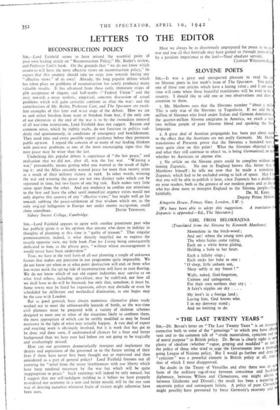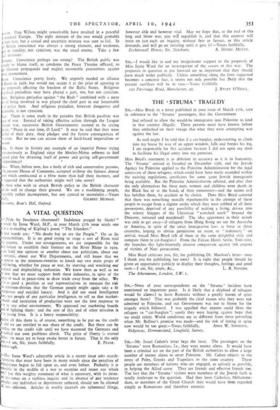THE LAST TWENTY YEARS"
Snt,—Dr. Bevan's letter on "The Last Twenty Years" is an interest: corrective both to some of the " grousings " to which you have affer vent and to the common talk of "etude materialism, cynicism and of moral purpose" in British policy. Dr. Bevan is clearly right in plenty of idealism (whether "vague, groping and muddled" or nd the policy of those who tried to urge the Government into a Thor" going League of Nations policy. But I would go further and deny " cynicism " was a powerful element in British policy at all, even that of which I most disapproved.
No doubt in the Treaty of Versailles and after there was an ae form of the ordinary tug-of-war between conscience and hard-fa diplomacy, between Wilson and Clemence,au, one might almost between Gladstone and Disraeli ; the result has been a wavering uncertain policy and consequent failure. A policy of pure Clemen, might possibly have prevented by force Germany's recovery and
Pure Wjlson might conceivably have resulted in a peaceful contented Europe. The right mixture of the two would probably ben best, but a casual and uncertain mixture was sure to fail. In at Britain conscience was always a strong element, ,and weakness, ae or timidity, not cynicism, was the usual enemy. Take a few -al instances:
ammo% Conscience perhaps too strong? The British public was ready to blame itself, to condemn the Peace Treaties offhand, to
German propaganda and neglect reasonable precautions against an rearmament.
ussia. Conscience pretty lively. We urgently needed an alliance Russia in I938, but would not accept it at the price of agreeing to n proposals affecting the freedom of the Baltic States. Religious political prejudices may have played a part, too, but not cynicism. tun. Religious prejudice against "the Reds" combined with a mere or of being involved in war played the chief part in our lamentable of po'icy here. And religious prejudice, however dangerous and ionable, is not cynicism.
face. There is some truth in the paradox that British pacifism was at of war. Instead of taking effective action through the League recent war, successive British Governments seemed to be crying !essly, "Peace in our time, 0 Lord." It may be said that they were ful of their duty, their pledges and the future consequences of action. But no one can accuse them of hard-faced imperialism or ion.
a. Is there in history any example of an imperial Power trying conscientiously as England since the Morley-Minto reforms to find agreed plan for divesting itself of power and giving self-government
dependency? •
axes. When, before now, has a body of rich and conservative persons, the present House of Commons, accepted without the faintest demur non which confiscated at a blow more than half their incomes, and suggested that the authorities might well take more?
o, those who wish to attack British policy or the British character ld do well to change their ground. We are a maddening people, possibly rather incompetent, but not cynical or materialist.—Yours escombe, Boar's Hill, Oxford.



























 Previous page
Previous page